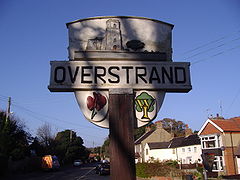Poppyland
| Overstrand | |
|---|---|
 The Village sign |
|
| Overstrand shown within Norfolk | |
| Area | 1.86 km2 (0.72 sq mi) |
| Population | 1,030 (parish, 2011 census) |
| • Density | 554/km2 (1,430/sq mi) |
| OS grid reference | TG2441 |
| • London | 137 miles |
| Civil parish |
|
| District | |
| Shire county | |
| Region | |
| Country | England |
| Sovereign state | United Kingdom |
| Post town | CROMER |
| Postcode district | NR27 |
| Dialling code | 01263 |
| Police | Norfolk |
| Fire | Norfolk |
| Ambulance | East of England |
| EU Parliament | East of England |
| UK Parliament | |
Overstrand is a village (population 1,030) on the north coast of Norfolk in England, two miles east of Cromer. It was once a modest fishing station, with all or part of the fishing station being known as Beck Hythe. In the latter part of the 19th century it was catapulted into prominence, and became known as “the village of millionaires”.
The London journalist and travel writer Clement Scott came to Overstrand in 1883, christened the area ‘’Poppyland’’, and wrote about the church tower on the cliff edge and its “Garden of Sleep”. While in Overstrand he stayed at the Mill House with miller Alfred Jermy and his daughter Louie, who became “the Maid of the Mill” in his articles about ‘’Poppyland’’.
Scott had many London contacts in the theatrical world, and his writings led a number of them and others from London society to come to Overstrand. Some bought land in the village and had houses built there, and for a while the village was the place to visit. A large hotel was built on the cliff edge, though this slid into the sea in the 1950s.
The Edwardian architect Sir Edwin Lutyens worked at Overstrand, designing Overstrand Hall for Charles William Mills, 2nd Baron Hillingdon, The Pleasaunce for Cyril Flower, 1st Baron Battersea and the Methodist Church. The large houses of the gentry have largely passed from private ownership to other uses.
Overstrand railway station was on the Norfolk and Suffolk Joint Railway between Cromer and North Walsham. It is now closed.
The Overstrand biplane bomber was named after the village, having been made at the Boulton & Paul aircraft factory in Norwich in the early 1930s.
...
Wikipedia

